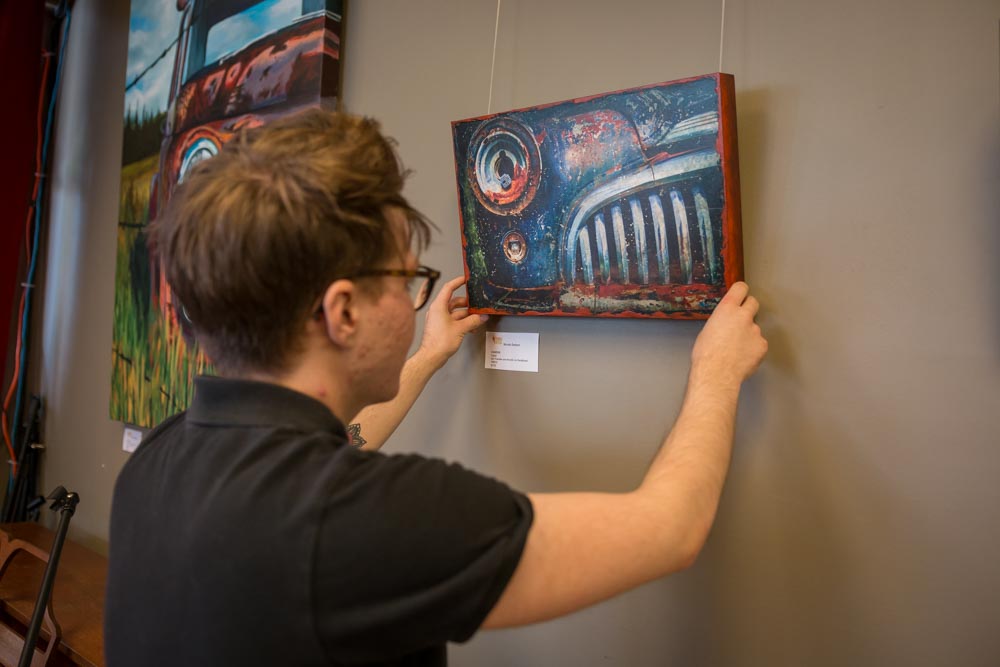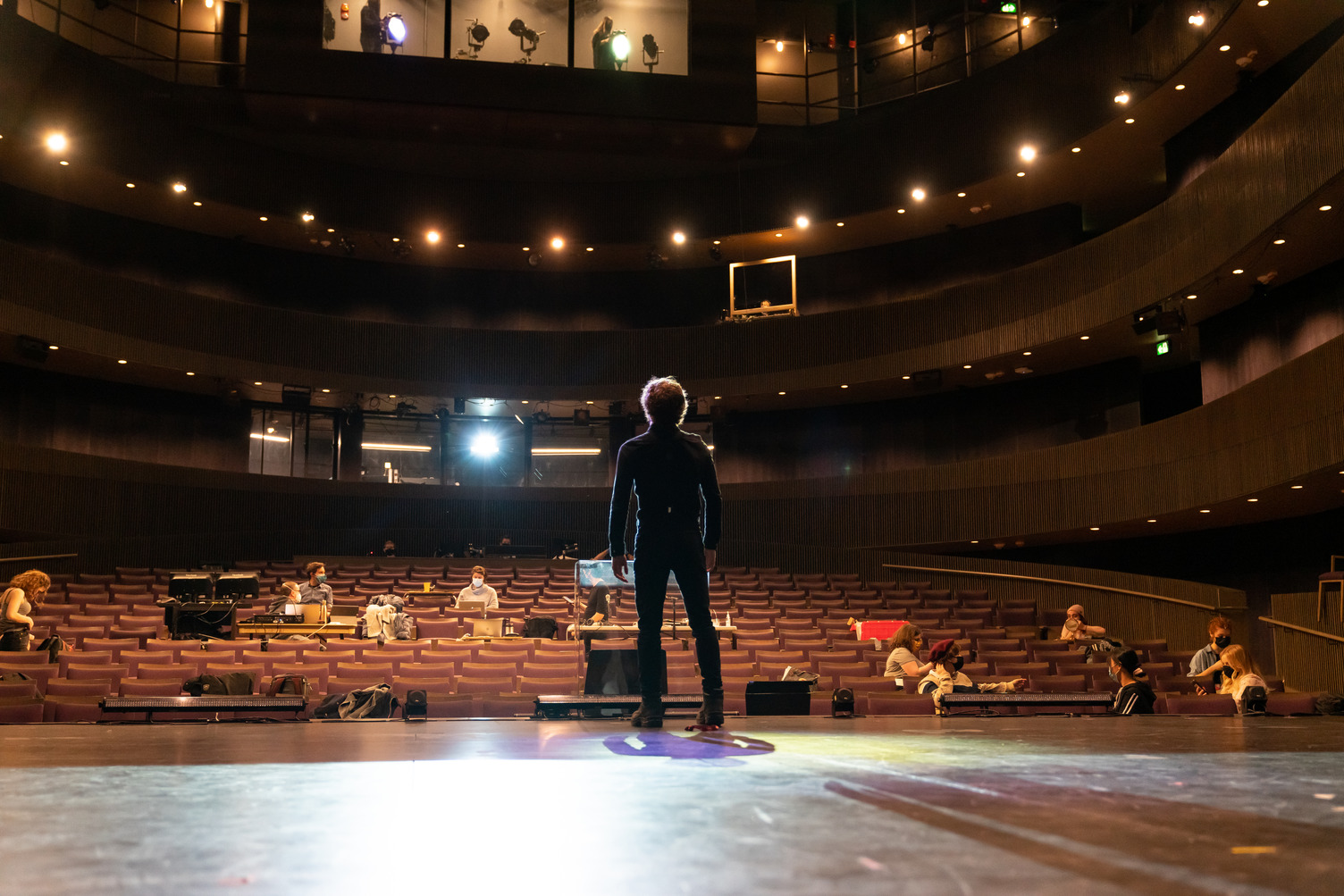New Program Prepares Students for Careers in the Arts
MacEwan University Set to Welcome its First Bachelor of Fine Arts Students
November 29, 2021

Sarah Huffman, general manager of Rapid Fire Theatre, is also an alum of MacEwan’s Arts and Cultural Management diploma program and a future student in the university’s new Bachelor of Fine Arts program.
“There has been pent-up demand for this degree for years—from our grads and the arts sector.”
When Sarah Huffman, general manager of Rapid Fire Theatre and a MacEwan University Arts and Cultural Management diploma graduate, got wind of the university’s new Bachelor of Fine Arts (BFA), she immediately started planning her degree—before the program was even taking applications.
“There has been pent-up demand for this degree for years—from our grads and the arts sector,” says Rose Ginther, associate dean in the Faculty of Fine Arts and Communications. “And during the past two years, the importance and value of arts education have only become clearer. People recognize the role that arts have in society—how they connect us and enable us to look at and challenge the world around us.”
The university's new BFA program, says Ginther, aims to graduate students who are experts in their chosen discipline, who see the world differently and who can challenge the status quo. To do that, the program grounds students with in-depth knowledge in each of its four core majors – arts and cultural management, music theatre performance, studio arts and theatre production—while weaving in a series of interdisciplinary courses designed to allow students to focus their experience and expertise on everything from placemaking and cultural studies to community engagement.
That interdisciplinary focus is exciting for Tiffany Shaw, an artist, curator and registered architect whose post-secondary journey began with a fine art diploma from MacEwan.
“I really think the interdisciplinary way is the future,” says Shaw. “When I’m working on an architectural project, I approach it as an artist, and when I’m working on public art, it’s informed by what I know about architecture. To me, they aren’t separate. It’s just one large interdisciplinary practice.”

In addition to gaining in-depth knowledge in their chosen major, MacEwan’s BFA students will choose from a series of interdisciplinary courses to focus on everything from placemaking and cultural studies to community engagement. Painting by Nicole Deibert.
Shaw says that she can trace the roots of her interdisciplinary approach right back to her time at MacEwan. "Learning how to think critically, being trained in how to critique and give feedback, and being able to look at things from many different perspectives are really tough skills to learn, and I so appreciated having those fundamentals when I left the province to pursue a BFA.”
But, she says, she would never have left Alberta if she could have continued her education at MacEwan.
There are incredible benefits to having learners stay here, says Ginther. “This city is a cultural centre, and there are so many great things that come with that, including the opportunity to engage with community partners and introduce work-integrated learning into our programs.”
The potential of that community engagement is already proving itself in a pilot of one of the program’s first interdisciplinary courses.
“We’re seeing innovative, creative thinking and the real value that comes with bringing different perspectives and disciplines together,” says Ginther. “Students are partnering with and contributing to the community in creative and meaningful ways.”
Sarah Huffman just happens to be in one of those groups and is working with her fellow students on a project to bridge the communication gap between artistic professionals of differing abilities.
“We’re working to create a collaborative workshop and networking space called HANDSHAKE that will provide American Sign Language training to meet the unique needs of our industry,” she says. “To me, this is about looking at ways we can keep ourselves, as arts organizations, accountable for our inclusivity and accessibility efforts.”
That collaborative, creative and entrepreneurial approach to solving problems will serve graduates well, says David Cormican.
“The arts are an entrepreneurial pursuit,” says the Emmy-nominated film and television producer responsible for the first Canadian Netflix original series, Between (who is also a MacEwan theatre arts alum recognized with a MacEwan Distinguished Alumni Award in 2016). “As Canadian creators, we can’t throw money at problems in the same way our American counterparts can—we have to rely on ingenuity, resourcefulness and creativity.”

Students in MacEwan University’s new Bachelor of Fine Art program can choose from four core majors – arts and cultural management, music theatre performance, studio arts and theatre production.
Nurturing those entrepreneurial skills and encouraging innovative approaches is important, adds Cormican. “Not only will those skills help students prepare for the realities of the industry today, but they will also help shape them into people who are ready to solve the problems of tomorrow—and for careers that are emerging or don’t even exist yet.”
Ginther agrees. This BFA isn’t about feeding workers into an existing system, she says, but rather enabling graduates to break the mold and create something new.
“We live in a time of incredible potential,” she says. “When our first BFA graduates head out into our communities, I think we will see them foster, develop and illuminate innovative and creative ways in which arts and culture contribute to us as individuals, to our communities and to the establishment of a just society.”
Branded digital content brought to you by ![]()



